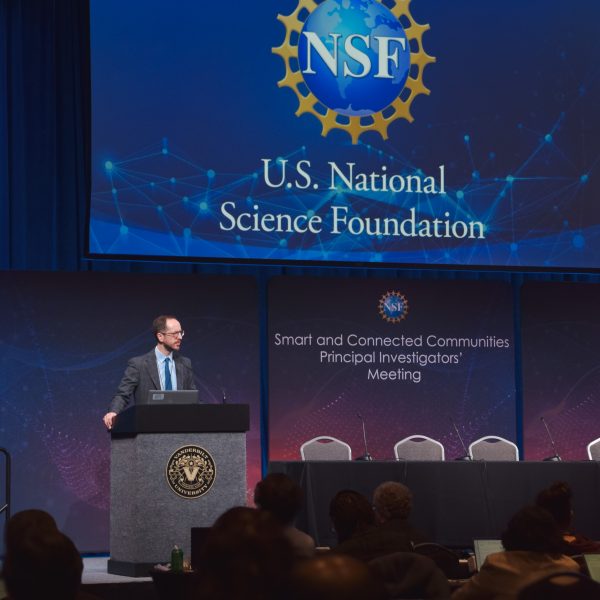Principal Investigators from around the country recently attended the national Smart and Connected Communities PI meeting held at Vanderbilt that highlighted how the university is collaborating in the use of smart transportation technology to meet community needs.

The PI meetings, which are held annually by the National Science Foundation, have traditionally been in Washington, D.C. But Vanderbilt researchers who helped organize the meeting here said the university was chosen to host the event Feb. 27-29 partly because of its nationally recognized work with community partners like Metro Nashville and the Chattanooga Area Regional Transportation Agency.
Vanderbilt is also the lead institution for the Smart and Connected Communities Virtual Organization that helps manage various aspects of the SCC program.
“The event showcased the special partnership between Vanderbilt University and its dedication to working with our community partners, ensuring that we use advances in AI (artificial intelligence) and engineering for the benefit of our community,” said Abhishek Dubey, co-organizer and associate professor of computer science and electrical and computer engineering at Vanderbilt. “We are at the forefront of these kinds of partnerships.”
About 250 PIs from various universities attended the event that included an address from Nashville Mayor Freddie O’Connell on the benefits of academic and community partnerships.
“Our vision for the future is a smarter and more connected Nashville, a more livable city for our residents,” O’Connell told the gathering. “Better use of technology, and better coordination with our partners, can help us get there.”
The meeting mainly focused on how AI and cyber-physical systems can help improve life and solve community problems. “Actually, taking engineering from the lab to the community,” said Abhishek, who is also a senior research scientist at the Institute for Software Integrated Systems (ISIS).
Vanderbilt and Metro Nashville have been working together for nearly a decade. In 2016 and 2017, Vanderbilt researchers partnered with WeGo Public Transit to build a decision-support tool that included scheduling optimization, delay prediction and event-impact analysis. In 2019, the researchers began a partnership with Chattanooga to design optimal microtransit. Additionally, in 2021, Vanderbilt started a project with Metro Nashville to design tools optimizing WeGo service availability with funding from the National Science Foundation (NSF) and Federal Transit Administration (FTA).
In 2022, Vanderbilt researchers worked with Metro Nashville’s Department of Emergency Communications, ITS, and Fire Department, to secure a CIVIC grant from the NSF for an AI-based system to appropriately route non-emergency calls, allowing greater focus on emergency calls.
Currently, researchers are collaborating with the Nashville Department of Transportation to deploy state-of-the-art lidar motion sensors at intersections to improve safety for vulnerable road users, such as pedestrians and bikers. And with nearly $1 million in funding from NSF and the National Institutes of Health (NIH), Vanderbilt researchers have designed an AI-powered driving simulator to teach driving skills to autistic individuals with the goals of improving employment and independent-living opportunities.
About two years ago, researchers tested an AI-powered cruise control system designed to increase fuel savings and ease traffic on the I-24 MOTION testbed just southeast of downtown Nashville. The only real-world automotive testing environment of its kind in the world, the smart highway is equipped with 300 4K digital sensors capable of logging 260,000,000 vehicle-miles of data per year.
Vanderbilt Professors Jonathan Sprinkle and Dan Work were the lead researchers on that project and the main organizers of the SCC meeting in Nashville.
“Vanderbilt being center stage at the SCC PI meeting is another example of the radical collaboration taking place at the university internally and externally,” said Sprinkle, who along with Work are also part of the Institute for Software Integrated Systems. “We look forward to even more partnerships as we seek additional innovative ways to meet the needs of the community.”
Contact: Lucas Johnson, lucas.l.johnson@vanderbilt.edu